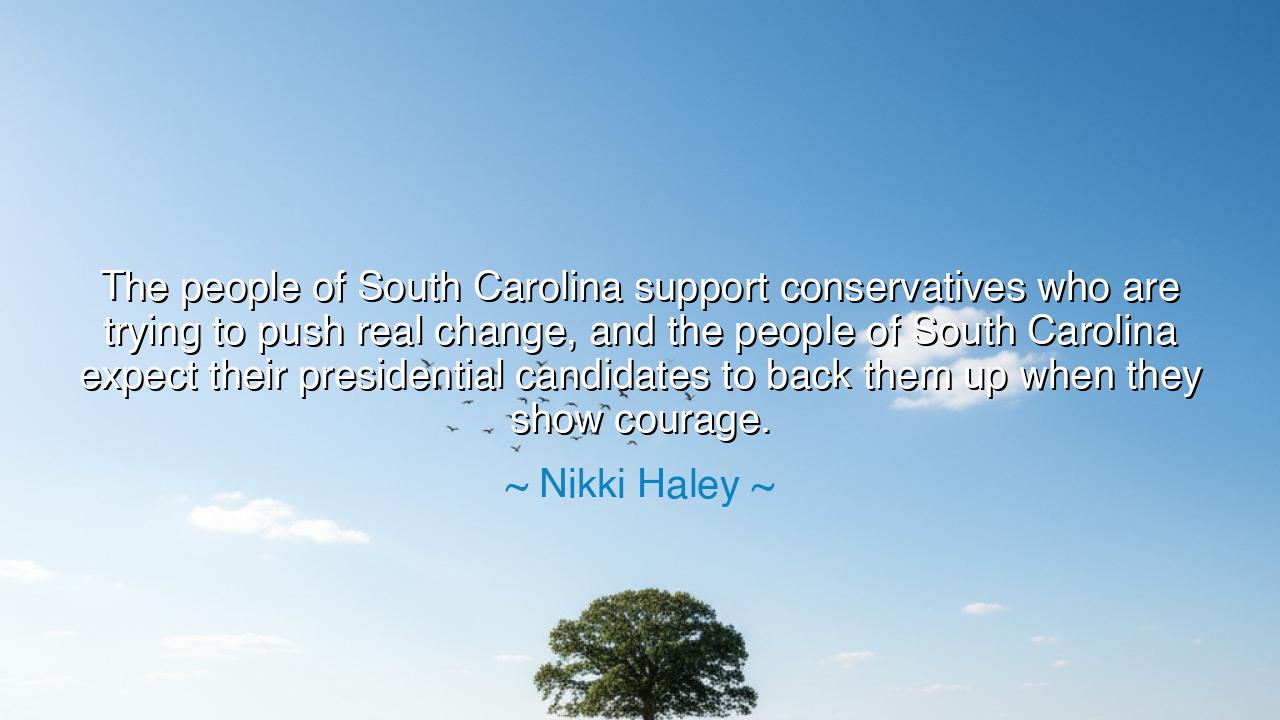
The people of South Carolina support conservatives who are trying
The people of South Carolina support conservatives who are trying to push real change, and the people of South Carolina expect their presidential candidates to back them up when they show courage.






In the words of Nikki Haley, “The people of South Carolina support conservatives who are trying to push real change, and the people of South Carolina expect their presidential candidates to back them up when they show courage,” we hear the voice of both conviction and challenge — a call to leadership rooted in courage, accountability, and principle. These words are not merely political; they are moral in nature, echoing the timeless idea that those who lead must serve not only the will of the people but the courage of the people. Haley speaks as one who has stood in the crucible of public service, urging both leaders and citizens to remember that progress is not born of comfort, but of boldness — the kind that dares to confront the status quo for the sake of truth.
The origin of this quote lies in Haley’s long journey through American politics, from her beginnings as a reformer in the South Carolina legislature to her years as governor and later as ambassador to the United Nations. In the heart of her state — proud, traditional, and fiercely independent — she witnessed firsthand that courageous leadership is not only admired but demanded. Her words reflect a deep understanding of the American spirit: that change worth having does not come through empty promises or cautious half-measures, but through those willing to take moral risks for the greater good. In this, she stands in a lineage of statesmen and women who saw public service not as privilege, but as sacred responsibility.
Haley’s invocation of “real change” recalls the ancient wisdom that progress must be both principled and daring. It is not enough to desire transformation; one must possess the courage to act despite opposition. The ancients knew this well. Pericles, in the early days of Athenian democracy, spoke of the duty of leaders to stand firm even when their choices drew anger from the people, for their purpose was not popularity but posterity. Likewise, Haley’s message reminds us that those who claim to lead must not shrink before the winds of adversity; they must become the oaks that stand against it. For it is not in the calm of approval that leaders are forged, but in the storms of resistance.
History gives us many examples of this truth. Consider Abraham Lincoln, who faced a nation divided and a chorus of voices demanding compromise with injustice. Yet he stood firm, guided by conscience rather than convenience. His courage to act — to issue the Emancipation Proclamation, to preserve the Union — was not an act of political survival but of moral necessity. Lincoln, like Haley’s vision of leadership, understood that true progress requires leaders who are willing to stake their legacy, even their lives, on what is right. The people followed him not because he flattered their fears, but because he appealed to their highest selves.
Haley’s words also carry within them a challenge to the people themselves. For she speaks not only to leaders, but to citizens — to remind them that courage is not the duty of the powerful alone. The people must also uphold those who dare to act with integrity, even when such acts disrupt the comfortable order. A nation’s character is reflected not just in its rulers but in its citizens’ willingness to defend truth over convenience. When the people stand by their leaders in times of trial, they become partners in courage — and from this partnership, nations are strengthened.
Yet she also reminds us that responsibility must accompany courage. To “back up” those who show bravery is not to follow blindly, but to recognize integrity when it stands before us. The people must demand courage, not arrogance; conviction, not self-interest. Likewise, leaders must serve humbly, knowing that the trust of the governed is both the source of their strength and the weight of their burden. This balance — between leader and people, courage and wisdom, change and duty — is what sustains every republic through the centuries.
Let this, then, be the lesson of Haley’s words: that courage is the heart of every great endeavor — in politics, in life, in the soul itself. Do not shrink from change because it is difficult, nor withhold your support from those who strive to make it. Have the discernment to recognize sincerity and the faith to stand with those who act in good conscience. For nations, like individuals, rise only when they value courage above comfort, and principle above fear.
So remember, O seeker of truth and servant of your time: real change is never easy, and courage is never without cost. But it is through the marriage of both — courage in leadership, and faith among the people — that societies are renewed. As Nikki Haley reminds us, the promise of a nation lies not merely in its power, but in the courage of its people and the steadfast hearts of those who dare to lead them.






AAdministratorAdministrator
Welcome, honored guests. Please leave a comment, we will respond soon